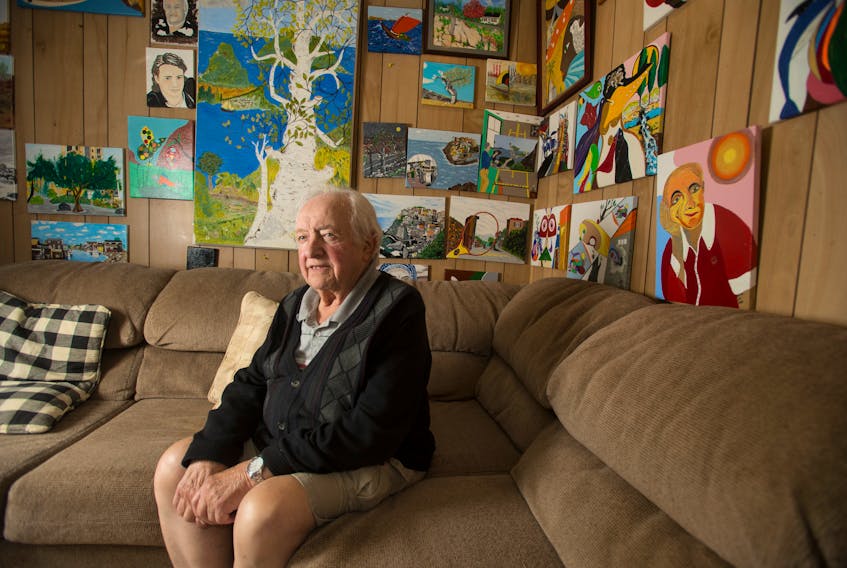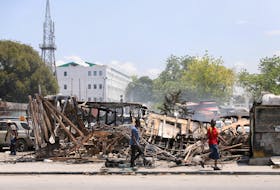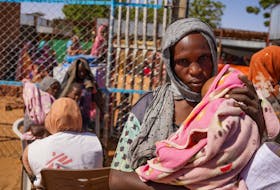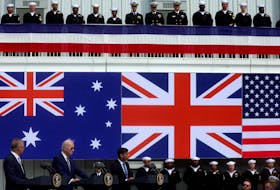HALIFAX, N.S. — Natan Nevo’s art workroom is filled with colourful landscapes and abstracts, depicting his outlook on life today – bright, cheery, optimistic.
During the Second World War in his native Poland, while in hiding and later trying to find refuge in deepest Siberia, Nevo didn’t have the same rosy outlook.

The Halifax man looks back at those days of living comfortably in Warsaw where his father, Menachem Jakubowicz, was a winemaker. Natan, then called Natek, and his older brother, Adek, lived among Polish people. He says Jews faced no anti-Semitism but for outbreaks here and there, but it wasn’t blatant until the war started in 1939.
Natan was nine years old when the running started. His father, by then in the Polish army, was taken prisoner by the Germans and released in Russia. He heard of the Jewish persecution in Warsaw and paid wine clients to bring his wife and their two sons to unite in the Ukraine. They were later sent to Siberia with hundreds of other Poles and Jews, travelling on animal trains, boats and open trucks to a village called Gorki.
His mother, Pola, well-educated and able to speak several languages, stressed learning, telling her boys, “You are in the wilderness of Siberia but education is education, and you have to continue it, wherever you are. Remember this forever!”
The next day, Natan recalls, “I was fearful starting school. I knew only Polish and Ukrainian. It took me a year to master Russian but I fit in and finished first in the class.”
In autumn 1945, the family moved several hundred kilometres south to Saratov, where Adek started medical school and Natan, at age 15, finished high school. By summer 1946, with the war ended, Poles living in Russia were permitted to return home, the Jakubowicz family among them.
Menachem rebuilt his wine business. Adek went to med school at University of Warsaw. Natan faced anti-Semitism at his school and refused to go, but connected with a Zionist youth organization that convinced him to go to Palestine and the Jewish homeland.
After training in France, Natan arrived in Palestine on March 15, 1948 and was sent to a kibbutz (collective farm) to be trained as a soldier. Two months later, he fought in the army to establish the new state of Israel.
A year later, he helped develop a new kibbutz, Megiddo, remaining there for five years, rising in military rank, and becoming a math instructor. By now, Adek was a physician in Israel and tried to convince his younger brother to study engineering (a definite no), and try law school (that lasted a year).
“I found a job with a bank so I could live independently rather than living with friends and family,” reflects Natan. “I also developed an affection for theatre, fell in love with a young woman, married, had a daughter and later divorced when I discovered my wife was unfaithful.”
He also changed his last name to a Hebrew one, commonly done in Israel, and chose Nevo, after Mount Nevo where God showed Moses the promised land.
The marriage collapse convinced Natan to leave Israel. At 31, he went to France, speaking only a couple of French words, but ready to start over in theatre. He quickly learned the language at L’Alliance Francaise and then the Sorbonne.
He met his future wife Denise in Paris. After a quick return to Israel where he couldn’t find work, Natan and Denise came to Halifax in 1965 to be with Adek, who was an established doctor there.
“I was 35, and spoke no English but found a job as a teacher at Cunard Junior High where Walter Fitzgerald was principal. For two weeks, I watched television to learn English and then started teaching French (in French) and European geography by using slides and my little bit of English. Denise worked as a lab technician.”
Within a year, he was hired to teach in the French department at Dalhousie University. Denise taught French at Dal, then Saint Mary’s University and later at Mount St. Vincent University.
Natan received a master’s degree in French at Dal, taught Russian, developed a Russian department at Dalhousie, earned a master’s in education, and then taught Russian for many years at Acadia University.

Natan studied painting in Paris. He took up the art as a hobby after retiring from teaching in 2000 and having the second of two heart attacks in 2002. His work has been sold in galleries but he paints primarily for pleasure and relaxation.
Natan returned to Warsaw in 1988 but was very depressed with what he saw, “nothing like before the war,” he says.
The war cost him many close relatives. His mother, who lived in Warsaw after the war, died there in 1948 of cancer. Later in life, his father lived in Israel, where he passed away.
“I often dream of my father even though I was closer to my mother but he lived longer and we were together in Israel. My brother died a year or so ago. He was 90 and I think about him a lot. I listened to him and took his advice.”
The Holocaust certainly had an effect on Natan. He says he’s in touch with Polish people in Halifax. “They’re nice people. They don’t show the hate of Jewish people that we saw in Poland. Today, and always, I look for the good in people. I try not to remember the bad things that happened."









